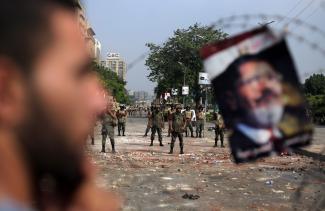Militärputsch
Die Menschenrechte der Muslimbrüder

It is obvious that Mohamed Mursi, Egypt’s elected president, failed in office. He should have tried to broker compromise and build consensus in a deeply troubled nation, but was only perceived to be ramming through the Muslim Brothers’ idea of how to run the country. In the end, even his Islamist allies of the Salafi Nour party supported the military coup that ousted him. In the face of growing opposition, Mursi’s government had begun to look out of touch.
Today, German newspaper commentators regret that there was a military coup, but they also emphasise that the Muslim Brothers did not adhere to democratic principles. That is true. It is equally true, however, that the military is not a democratic force either, and that the democratic credentials of other political forces are unproven, to put it mildly.
- The Salafis’ ideology is rigidly Islamist.
- Egypt’s various leftist, liberal and secular forces, so far, have excelled in infighting, but have never come up with a convincing leader or a coherent approach to policymaking.
- The rebel youth movement that contributed to undoing both Mubarak and Mursi is just that: a rebel youth movement. It knows what it does not like, but it is not – and cannot be – a political party with a stringent agenda.
Mursi and the Muslims Brothers are now cast in the role of the villains. In spite of their failure, this is the wrong approach to tackling Egypt’s problems. Democratisation after decades of despotism is always a huge challenge. In Egypt, it will not succeed against the oldest and strongest political non-governmental force, which also happens to be the only one with truly national reach.
The Muslims Brothers suffered oppression in decades of authoritarian rule before the Arab spring began in early 2011. They know how to survive as a clandestine organisation and their historically-founded sense of paranoia has most recently been re-confirmed by military action. It will be very difficult to involve them in politics in a constructive manner – but unless that is done, there can be no success. In any case, their human rights must be respected.
Unfortunately, that does not seem to be the case. Egypt’s military seized power in early July to prevent bloodshed – and the result is bloodshed. According to media reports, some 50 people were killed in the first week after Mursi was ousted. Leaders of the Muslim Brothers are in detention. Some media outlets that were close to this organisation have been shut down.
Western governments tried to cooperate with Mursi, but none of them seemed enthusistic about doing so. Western leaders certainly did not succeed in convincing him of the principles that facilitate the kind of democratic pluralism that relies on majority rule as well as minority rights. The same leaders now need to make it very clear to Egypt’s new leadership, that human rights are the indispensable priority, and that, in spite of all the difficulties, those rights apply to Muslim Brothers too.
Egypt’s new leadership will be more willing to listen to them than Mursi was. The fact that Mohamed El-Baradei was considered to become prime minister proves its willingness to cooperate with the west. El-Baradei is a brilliant and seasoned diplomat with a strong international reputation, but his following in Egypt is small. Picking him would have reassured observers in Washington, Brussels or Berlin, but not necessarily people on the streets of Cairo or in the villages of the Nile Delta. For the sake of Egypt’s transition to democracy, the latter matter more.










